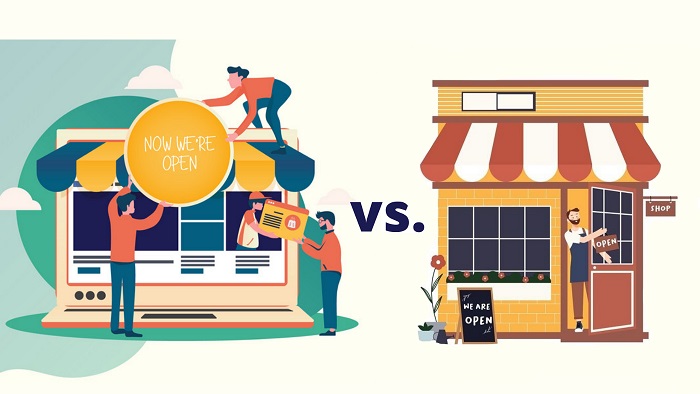Is There Any Difference Between E-commerce and Retail?

You probably already know that being able to correctly label and describe your business, and particularly the product you sell, is an essential part of selling in your field. When someone asks about your business or searches for you online, you need to be able to communicate confidently, whether it’s an e-commerce business or an online retail store.
To start with a simple definition, both markets involve the buying and selling of goods between the dealer and the buyer. Online trading is very similar to stationary trading. Just as a customer walk into a store, searches for products and brings them home in a shopping bag, they can do the same in online retail. You can see color variations, read descriptions, and even follow a detailed sizing chart to make sure you get the right size. Many large retail stores even offer both physical and online shopping options. E-commerce also includes electronic transactions, but the difference is that it includes many other services that are not physical, such as Marketing. It is often represented by platforms that provide a space for other merchants to sell their products to consumers for a fee, which is usually a commission.
-
E-Commerce:
Electronic commerce refers to conducting commercial activities such as buying and selling products, transactions, etc. They are conducted over an electronic network, that is, the Internet. Physical interaction with the product is not possible, it means that the customer can only see the image and the product videos and make the decision. A customer can easily compare the price at different providers. When a customer decides to engage in ecommerce digital products, they (but not always) have to pay for shipping costs along with the cost of the product. It has a large consumer focus and reach, and its reach is global.
Types of E-Commerce:
Online commerce can be creative, and it’s not as easy as it seems. However, e-commerce is booming and different categories have emerged within the market. Here are six main types of e-commerce:
- Business to Business – B2B
- Business to Consumer – B2C
- Consumer to Consumer – C2C
- Consumer to Business – C2B
- Business to Administration – B2A
- Consumer to Administration – C2A
Benefits of E-Commerce:
- Serves customers across a large geographic area.
- The cost of starting an ecommerce business is low.
- customers can shop 24/7 a week.
- Allows comparison of product prices from different e-commerce sites.
- It is convenient as customers can shop from the comfort of their own homes.
- It is easy to search for rare items online.
-
Retail:
Retail refers to conducting business through personal business operations, such as shopping malls, supermarkets, department stores for the consumer in a small quantity. In this physical interaction with the product, it is possible for the customer to hold/touch the product, feel the product and make the decision. A customer cannot easily compare the price of different providers. If a customer chooses retail marketing, they don’t have to pay shipping costs, only the customer pays for the product. he/she bought. It doesn’t have that big a consumption focuses and scope, and its scope is limited to a specific region.
Benefits of Retail:
- Consumers have face-to-face communication with the seller, which increases the chances of closing a sale.
- consumers can see and even touch a product before they buy it.
- This minimizes the possibility of returns.
- Goods are received immediately after purchase.
- No shipping costs.
- It’s easy to return defective items.
Difference between E-Commerce and Retail:
Comparing Ecommerce and Online Retailing You might think that these advantages of ecommerce aren’t far removed from the advantages of online retailing. of electronic commerce. A big difference is the fact that e-commerce generally involves creating a platform for sellers to offer their products or services to consumers.
Take Shopify for example. Platform participants can essentially build their own business through the platform and skip much of the hassle that comes with starting from scratch. Platform owners provide a variety of ready-made tools to build a brand and set up a store. They help with marketing tips and great customer support. The effort required to provide all these services is paid for by commissions from their providers.
There is often much more to be gained by offering this service to small business founders than the traditional online retail account. Even for sellers on ecommerce development company like Shopify, Amazon, or eBay, the benefits are often far greater than starting your own. You can quickly expand your customer reach as e-commerce agencies open up access to other advertising channels. You are more likely to sell to niche markets, since purchasers in these realms often don’t know where to go to buy their product. Using sites like these can quickly improve your brand image, and get you out on the market to make a name for yourself.